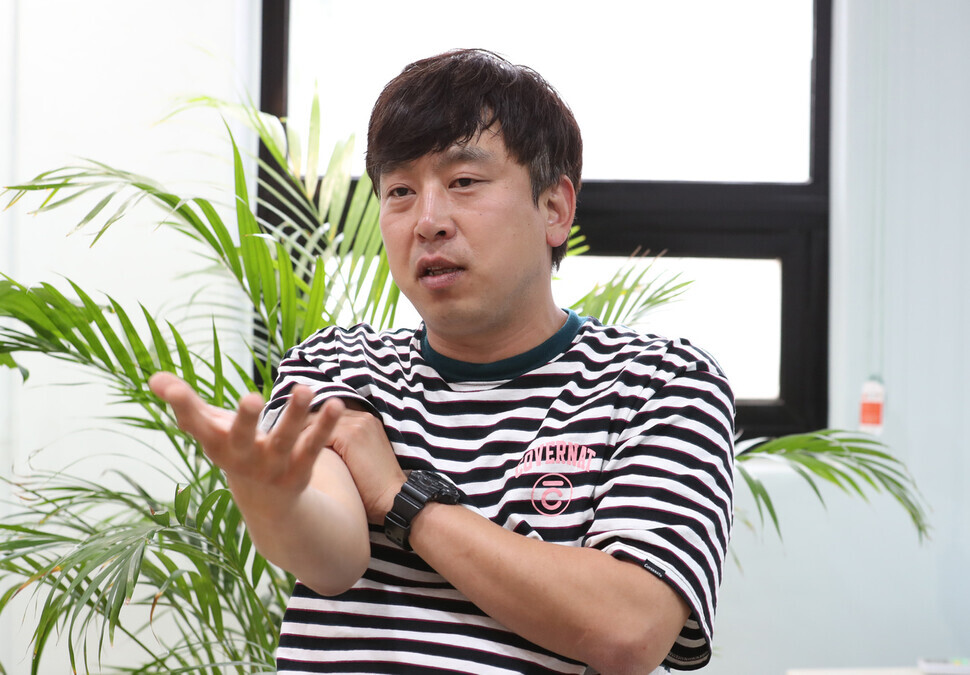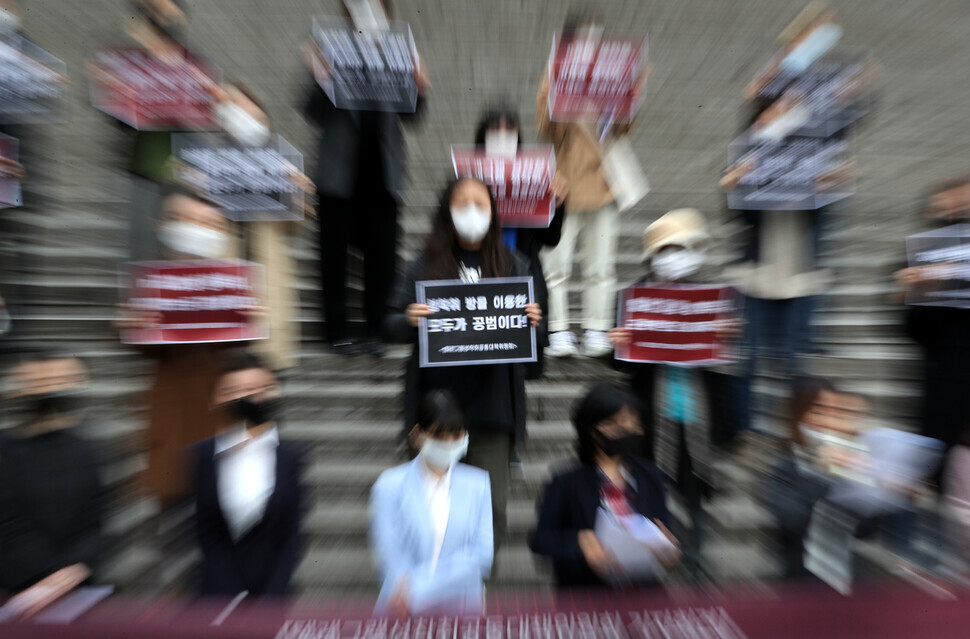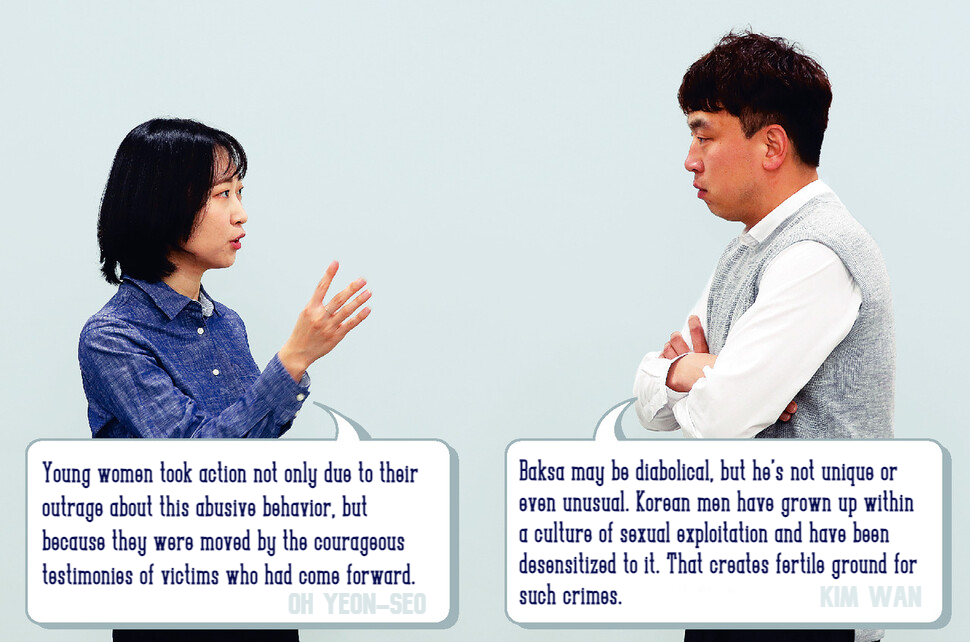hankyoreh
Links to other country sites 다른 나라 사이트 링크
Welcome to cyber hell: How Korean journalists shined a light on an online sextortion ring

Editor‘s note: “Cyber Hell: Exposing an Internet Horror,” a documentary exploring the Nth Room case, premiered on the global streaming service Netflix on May 18, 2022.
“Cyber Hell” examines the cybercrimes committed in the Nth Room through interviews with 24 of the people who investigated it, including journalists, producers and police. Among those providing their vivid recollections for the camera are the members of “Team Flame,” which first investigated the case, as well as Hankyoreh reporters Kim Wan and Oh Yeon-seo, who first reported the story, and members of the police’s cyber investigation team.
As “Cyber Hell” hits screens across the world, we’re bringing back some of the Hankyoreh‘s articles from its special feature on sexual exploitation spreading on Telegram to shine a light on the issue of cyber sex crimes in Korea.
While there have been numerous articles about the disturbing sexual abuse perpetrated by the operators and members of secret chatrooms on Telegram since Cho’s arrest, newspapers were strangely silent after the Hankyoreh’s initial reporting.
That reflected the cynical view that this incident wasn’t such a big deal, considering that such exploitative videos have always circulated and will continue to circulate in Korean society. The Hankyoreh’s reports actually brought more users to the “Baksa Room,” enabling Cho to charge members a higher fee. Other chatroom operators sarcastically said they hoped the Hankyoreh would report on their operations, too, so they could get the bump in members.
While Cho’s case could have been swept under the rug, as others like it have, young Korean women fought resolutely to keep the issue in the public eye and make sure that these sexual abusers were brought to trial. Along with creating “Project ReSET” to report sexual abuse taking place on Telegram, these women made sure the gruesome crimes of the Nth Room weren’t forgotten by urging people on Twitter to sign petitions to the National Assembly.
Two university students who called themselves “Team Flame” infiltrated the secret chatrooms and meticulously collected information that they then provided to the press, as well as to the police. Thanks to their efforts, these sex offenders are being brought to justice one by one.
But this is just the beginning. We sat down with Kim Wan and Oh Yeon-seo, the Hankyoreh reporters who covered the story, to talk about what should be done to prevent other people from repeating Cho’s crimes.
■■■■■■■■■■■■■■■■■■■■■■■■■■■
At 5 pm on March 17, 2020, as pool reporters at the Seoul Metropolitan Police Agency were wrapping up their articles for the day, they received a message from the police agency.
“A criminal suspect who was interrogated from 10 pm on the 16th to 1 am [on the 17th] in the cyber safety department on the second floor is being tested and quarantined for what may be COVID-19.”
The message unleashed a series of frantic phone calls as reporters tried to figure out which of the criminal suspects might have COVID-19. Soon, the agency sent out a second message.
“A total of four suspects including the likely operator of the ‘Baksa Room’ are currently detained for questioning on March 16-17 in connection with the ‘Baksa Room’ incident on Telegram. We hope you will understand that we cannot provide detailed information about an ongoing investigation.”
The reporters needed to confirm that the “likely operator of the ‘Baksa Room’” was in fact the “Baksa” who had masterminded the activities described in the Hankyoreh series the previous November about explicit materials circulating on Telegram.
The individual who went by the alias “Baksa” or “the Doctor” lured women in with the offer of part-time jobs. After coercing victims into sharing their personal information, he would blackmail them into shooting explicit videos, which he then sold in secret chatrooms on Telegram.
Instructing victims to write messages on their own bodies such as “Baksa’s slave,” he would share the exploitative content with a message that read, “I’ve got stuff on [the victim], so she won’t report it. Do whatever you want.”

Kim Wan, the reporter with the Hankyoreh’s 24-hour team who investigated the story, had taken the day off for caregiving leave and was giving his children a bath when his editor called.
Kim recalled his editor saying that they’d given the police all the information that could identify Baksa from Kim’s investigation since October of the year prior, including Baksa’s bitcoin address.
“So I knew they’d get him quickly. But even though the police said there had been a ‘lot of progress on the case’ and that they were ‘nabbing him soon,’ another four months went by,” Kim said.
“But I was bewildered and outraged when reporters suddenly found out about a strong suspect in the Baksa Room cases due to his suspected COVID-19 symptoms,” he said. Kim confirmed that the suspect was indeed Baksa, a former school newspaper reporter in his 20s.
Oh Yeon-seo, who focused her coverage on the victims in the case, was the one who informed the victims that 24-year-old Cho Ju-bin had been arrested.
“They were all surprised, but they also said they had mixed emotions,” she recalled.
“At first, they thought, ‘That’s great, now he’s in for a severe punishment.’ But after the reports that followed, some of them told me, ‘I’ve been in and out of the hospital after reliving all of the things I had forgotten about. Maybe it would have been better if he hadn’t been caught,’” she said.
“They also saw in the news about how [Cho] had done volunteer activities and had a high GPA, and they worried that he was going to get portrayed as a ‘model student’ later on.”

A timely tip from another chatroom manager
In November 2019, the Hankyoreh broke the story of the circulation of sexually exploitative materials on Telegram, after being tipped off that a high school student in Incheon was circulating explicit images and videos of children and teenagers in a Telegram chat room with around 9,000 members. In March 2020, the two reporters responsible for the story spoke about their investigation and the impact it left on them.
Hankyoreh (Hani): Your first article came out on Nov. 11 of 2019, and there was a four-part series that began running in March 2020. Is it true that it all started with an anonymous tip?Kim Wan (Kim): I found this out later, but the initial tip came from the manager of another Telegram chatroom who was trying to score a blow against the competition.
The secret chatroom that we first reported on, which was called “Official Link [name redacted] Room,” was a kind of hub or portal for sharing links to sexually exploitative videos and photography. That room had gotten so big that a different chatroom’s mod had sent in a tip in order to curb it.
In that world, the most terrifying punishment you can imagine is having your identity revealed. The person who gave the tip had seen that the operator of this room sent a chat message about what the school lunch menu was one day. Using that, they checked the menus at local middle and high schools, and they figured out which school it was from that.
In investigating that tip, I came face-to-face with this unimaginable world of people making and circulating sexually exploitative material on Telegram. There wasn’t a minute in the day that messages weren’t going up in this private Telegram chatroom.
Every day, there were dozens of different chatrooms appearing and disappearing — copycat rooms and spinoff rooms. At the time of our investigation, there were hundreds of rooms with some variation of “Nth Room” in their name.
Hani: What were the chats like? In the article, you talked about feeling like you “might vomit.”Kim: I can’t put it in words. It was just a scene of humanity at its absolute lowest.
Women were objectified, literally treated as objects, and there was no sense of guilt at all about dominating and subjugating them. They treated women as objects of rape.
I did feel several times like I might actually throw up — especially with anything that Cho Ju-bin himself posted. More than anything, I could only wonder why the members were so eager for that, why they were praising him.
They were gratifying their desires for control [over women] that they couldn’t satisfy in the real world. There may also have been the thrill of being involved in something illicit, and seeing the way they cheered it on also made me feel physically sick.
There wasn’t even a modicum of morality or shame. I didn’t know what could be done.
Oh Yeon-seo (Oh): These people know that sexual exploitation is a crime, but the people in these Telegram rooms thought what was being done to the [victims] in these chatrooms wasn’t a crime. In their eyes, it wasn’t a crime to intimidate and harass these young women — they were there for the money, they were “slaves,” and they weren’t going to report it, they said.
Thousands of men cheered on these crimes and asked for videos that were even “harder.” It was the scene of a murder committed against a person’s dignity.
Hani: Were there any times that you felt afraid?Oh: It hit me when I saw illegally filmed videos showing women visiting a subway station restroom. I knew that stuff like that existed, but this was the first time I’d actually seen it for myself. I just kept looking at it and getting chills thinking, “This is happening where I live. This could happen to me.”
I also once spoke on the telephone with a victim to talk about what had happened, and then the next day I saw a video that matched her story. Even after victims had reported the situation and asked for the videos to be taken down, they were still being circulated in Telegram chatrooms.
That was a shock in itself, but it was also unsettling for me to watch the video after interviewing the victim. It felt like I’d become one of the perpetrators.

Nth Room visits rise after Hankyoreh report
The initial report did not have a major impact, nor did a series exploring the types of sexual exploitation and structures operating in the Nth Room and Baksa’s Room.
The media were oddly silent. As recently as December 2019, the Hankyoreh was the only one of the 54 news outlets registered with news big data analysis tool Big Kinds to have reported on the Nth Room case. In 2020, various follow-up reports began to emerge on the SBS program “Curious Stories Y” and the Kukmin Ilbo newspaper, which published “Infiltrating the Nth Room.”
“The problem is that South Korean society doesn’t view this problem as anything new,” Kim said. “There have always been sexually exploitative videos online, and people don’t really see what the fuss is about.”
“That’s the level of the debate in the National Assembly Legislation and Judiciary Committee [which discussed legislation to punish crimes of sexual exploitation through Telegram and other platforms], and the attitudes of the media and investigators haven’t been much different,” he added.
“It’s because of those naive attitudes that we’ve been unable to solve the problem of sexually exploitative material circulating online, which has continued all the way from the birth of the internet up until today.”

Oh: The fact is that the police have been slow to investigate these cases. When we asked them to assign a woman investigator because of the horrific nature of the crimes, the police said no one was available. They would just tell us to leave our phone numbers because it was tough to make cases about crimes on Telegram.
They also asked us for evidence, but that’s not easy to provide when we’re talking about secret chatrooms on Telegram that disappear in a matter of seconds. I’m not sure how feasible it is for victims to take screenshots of nude pictures of themselves. It took a lot of courage for those victims to go down to the police station, and they’re sure to be hesitant about reporting that kind of crime again. The police won’t let women’s advocacy groups file charges either on the grounds that the victims need to show up themselves.
Kim: The police are frustrated that they get few results relative to the effort that goes into investigating online sex abuse. They have to monitor Telegram chatrooms around the clock for two or three months and then even when they do catch someone, they’re let off with a fine or a suspended sentence because it’s their first offense. The police say they don’t have sufficient staff to work those kinds of cases.
Hani: Didn’t distribution of those abusive materials decrease after your reporting was published?Kim: When our first story went up, the users scattered, and people thought that [the activity on] Telegram was over. But since it was just the Hankyoreh running occasional stories, traffic in the chatrooms ended up increasing. Users said they were looking for the Baksa Room, which they’d heard about on the Hankyoreh.
That thrilled Baksa, who then started making even more chatrooms. He raised the admission fee to 2 million won [roughly US$1,700] and promised free admission to his room for anyone who could dox a Hankyoreh reporter.
In the end, my personal information was leaked, including photographs of my children. Some people threatened to teach me to watch my back when I go out, while others mockingly said they hoped I’d report on their chatrooms [so they could become as popular as Baksa’s]. There were even comic strips that depicted me as a garbage journalist. I felt so frustrated and helpless and thought I’d run out of options.
Oh: It was hard. Most of all, I felt bad for the victims. Given how shameless the crimes were, I found myself wondering what would happen to the victims if the perps actually got away with it.
After our reporting, we didn’t get a lot of requests for help from other victims. At first, there were only three or four phone calls. It was discouraging to think that all our work had been for nothing.
Then Baksa leaked photos of female victims with a watermark that said “Hankyoreh Victim No. 1” and “Hankyoreh Victim No. 2.” It was an attempt to intimidate us with the prospect of more women getting victimized if we continued our reporting.

Objectifying women without a trace of guilt
Hani: I guess you’ve come to understand how these women become victims of sexual exploitation.Kim: I saw a victim being blackmailed in real time in a chatroom, and it didn’t even take three hours from when they logged in until they were filming an explicit video. It all happens in a flash, in the space of a morning or afternoon.
The victims are vulnerable women who are struggling to get by, which leaves them with no choice but to sell pictures of their body. When they go up against Baksa, who knows exactly how vulnerable they are, they get sucked right into it. With their personal information out there and their videos posted, they feel completely helpless.
Hani: Even so, Cho Ju-bin was put behind bars. How was that possible?Kim: I think that shows the strength of the young women who kept the spotlight on this issue by petitioning the National Assembly. Our reports could easily have vanished without leaving a mark, except for the police carrying on an obscure investigation.
But the issue was kept fresh by women in their 20s who petitioned the National Assembly to change the laws and by small-time media with a predominantly female readership who kept the conversation going. The term that was mentioned the most on Twitter last year after “Corruption Investigation Office for High-ranking Officials” was “Nth Room.” A lot of people kept talking about this because of their fervent desire to find a solution.
■■■■■■■■■■■■■■■■■■■■■■■■■■■
Some of the women who worked the hardest for this cause were the university students in Team Flame, the group that was the first to raise awareness of the sexual abuse circulating on Telegram.
After learning in July 2021 that explicit material involving children and teenagers was being circulated on Telegram, a group of women infiltrated these secret chatrooms as members and monitored the conversation for around two months. After confirming that people were being victimized by the explicit material, they gathered evidence and handed it over to the police.
One of the results of their investigation was an article titled, “Do you sell underage porn?” that was published by the Korea News Agency Commission in September 2019. The Hankyoreh came across this story when it began its own reporting in October of that year after being tipped off about the Telegram chatrooms and then received material from Team Flame. The material collected by the group was instrumental in the police bringing down a string of digital sex offenders.
ReSET, a group that began working to report sexual exploitation on Telegram in December 2019, got more than 100,000 people to sign a petition asking the National Assembly to take action on digital sex crimes.
“Young women took action not only due to their outrage about this abusive behavior, but because they were moved by the courageous testimony of the victims who had come forward. After the women were doxed on Telegram chatrooms, some even had men following them home and threatening them. Those women agreed to be interviewed despite their fear and uncertainty,” Oh said.
“Some women had taken shelter with friends but hadn’t even managed to tell the person they were staying with what they’d gone through. I later realized that the testimony those women gave despite their hardship is how this all began.”
Hankyoreh watermark on photos of victims
Hani: I’m worried that this will eventually just fizzle out as in the past. What do you think needs to happen to fundamentally solve issues like the Nth Room?Kim: Baksa may be diabolical, but he’s not unique or even unusual. He carried out some horrible crimes, but Korean men have grown up within a culture of sexual exploitation and have been desensitized to it. That creates fertile ground for such crimes.
That’s the basis for everything like Baksa’s Room and the Nth Room. That’s why we need to make sure they’re all caught. Not once have we taken a no-tolerance approach to punishing digital sex crimes. If we can’t apprehend these people under the current legal regime, we should create a special law so that the members of these chatrooms — the ones actually watching these videos — can at least be fined. As a society, we need to impress upon people that this kind of behavior is a crime and that it’s not OK.
■■■■■■■■■■■■■■■■■■■■■■■■■■■
After his expose went up, Kim got a call from a friend. They said that over the last few months, mothers of high school boys had been making a point of checking whether the Telegram app was installed on their sons’ mobile phones.
When the Nth Room was set up on Telegram in early 2019, Telegram was one of the most-downloaded apps on Google’s app marketplace, with somewhere between 300,000 and 500,000 users at the time.
“We can’t let masses of teenagers feel that there are absolutely no consequences when they objectify women and think of them as targets for crimes,” Kim said.
Oh felt dumbstruck when she stumbled upon a blog post that suggested ways to get around the Act on the Protection of Children and Juveniles from Sexual Abuse. She’d assumed there would be questions about how to delete records of visiting the Nth Room, but instead, the posts urged people who’d been viewing abusive material in other chatrooms to sign the petition about addressing the Nth Room. Their strategy was to distance themselves from the Nth Room and present themselves as being different from who they were.
“When someone said they’d deleted the [sexually exploitative] videos of children and teens they’d watched from Google Drive and asked whether they’d be OK, the response was that they didn’t need to worry because only the Nth Room was being targeted,” Oh said.
“People kept saying they wouldn’t be caught because they hadn’t left any traces and therefore weren’t criminals. That’s why I think they all need to be questioned by the police regardless of the potential sentence so that there will at least be a record. That’s where we need to start.”
By Jung Eun-ju, staff reporter
Please direct questions or comments to [english@hani.co.kr]
Editorial・opinion
![[Editorial] Seoul failed to use diplomacy with Moscow — now it’s resorting to threats [Editorial] Seoul failed to use diplomacy with Moscow — now it’s resorting to threats](https://flexible.img.hani.co.kr/flexible/normal/500/300/imgdb/original/2024/0624/8217192182656295.jpg) [Editorial] Seoul failed to use diplomacy with Moscow — now it’s resorting to threats
[Editorial] Seoul failed to use diplomacy with Moscow — now it’s resorting to threats![[Column] Balloons, drones, wiretapping… Yongsan’s got it all! [Column] Balloons, drones, wiretapping… Yongsan’s got it all!](https://flexible.img.hani.co.kr/flexible/normal/500/300/imgdb/original/2024/0623/9117191084517636.jpg) [Column] Balloons, drones, wiretapping… Yongsan’s got it all!
[Column] Balloons, drones, wiretapping… Yongsan’s got it all!- [Editorial] It’s time for us all to rethink our approach to North Korea
- [Column] Why empty gestures matter more than ever
- [Editorial] Seoul’s part in N. Korea, Russia upgrading ties to a ‘strategic partnership’
- [Column] The tragedy of Korea’s perpetually self-sabotaging diplomacy with Japan
- [Column] Moon Jae-in’s defense doublethink
- [Column] S. Korea-China cooperation still has a long way to go
- [Editorial] Seoul must use tact and diplomacy to check deepening Russia-NK ties
- [Editorial] Thorough audit, evaluation of oil test drilling are needed
Most viewed articles
- 1Enough trash-slinging — it’s time to pursue ‘strategic communication’
- 2[Editorial] Seoul failed to use diplomacy with Moscow — now it’s resorting to threats
- 3[Column] Balloons, drones, wiretapping… Yongsan’s got it all!
- 4Han says he’ll seek special counsel bill on Marine’s death if elected PPP chief
- 5After Putin’s Pyongyang summit, Seoul and Moscow play dangerous game
- 6[Editorial] It’s time for us all to rethink our approach to North Korea
- 7Is Korea ready to protect the rights of Filipino domestic workers arriving this fall?
- 8Russia might provide military tech assistance to N. Korea if S. Korea crosses red lines, says expert
- 9Seoul hints at lethal weapons aid to Ukraine to put pressure on Russia
- 10US nuclear-powered carrier arrives in Busan for drills with South Korea, Japan